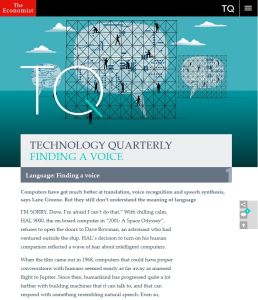Join getAbstract to access the summary!

Join getAbstract to access the summary!
The Economist
Technology Quarterly: Finding a Voice
Computers have got much better at translation, voice recognition and speech synthesis, says Lane Greene. But they still don’t understand the meaning of language.
The Economist, 2017
What's inside?
Increasingly sophisticated language technologies are gradually becoming part of everyday life.
Recommendation
From Terminator and I, Robot to Ex Machina and Blade Runner, many films have imagined the existence of human-like, intelligent machines. While artificial intelligence has been making huge progress, one area stubbornly remains the domain of humans: the ability to understand the meaning of language. Lane Greene, deputy editor for books and arts for The Economist and author of You Are What You Speak, looks at language technology research and its many obstacles and challenges. getAbstract recommends this article to anyone fascinated by the future of language technologies.
Summary
About the Author
Lane Greene is The Economist’s deputy editor of books and arts, and author of You Are What You Speak, a book about the politics of language around the world.





















Comment on this summary